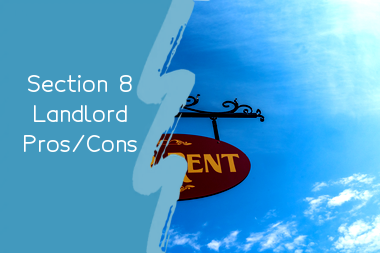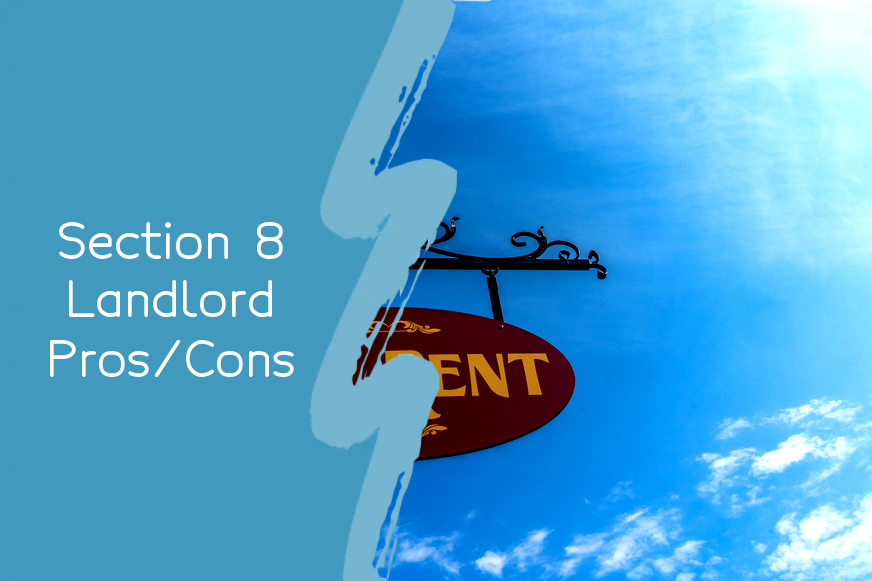Landlords should rent to Section 8 tenants because:
- 1. Consistent rental income: Rent payments come from the government, so landlords can expect a reliable source of income. The government also ensures on-time payments, so landlords don't have to worry about late payments or defaulting tenants.
- 2. Lower vacancy rates: Section 8 tenants may stay longer in a rental unit since they have a limited pool of homes to choose from. This equates to less time and money spent on finding new tenants.
- 3. Good screening process: The government performs a thorough screening process for Section 8 tenants, which includes criminal background checks, credit score checks, and landlord references. If a tenant has a history of eviction, the government will not issue a voucher for that tenant, reducing the landlord's risk.
Landlords should not rent to Section 8 tenants because:
- 1. Security concerns: Section 8 tenants with criminal backgrounds or prior evictions may pass the government screening process and move into a rental unit. This puts neighbors and landlords at risk, potentially causing damage or harm.
- 2. Property damage: Some landlords have reported excessive damage and repair expenses when renting to Section 8 tenants. Since the government covers the vast majority of the rent, tenants may have less incentive to maintain the property and be more careless.
- 3. Restricted income: Section 8 tenants have limited financial resources, and the government may dictate a maximum rental price that does not cover all expenses, including repairs and taxes. Landlords may need to supplement rent payments, which lowers their return on investment.
Ultimately, the decision to rent to Section 8 tenants depends on individual landlord preferences. For some, the reliable rental income and strict screening process may outweigh potential risks and disadvantages. Others may prioritize security and property maintenance concerns, leading them to avoid Section 8 tenants.
How does Section 8 work?
Section 8, or the Housing Choice Voucher Program, is a federal program that provides rental assistance to low-income families, seniors, and people with disabilities. Here's how it works:
- 1Eligibility: To be eligible for the Section 8 program, you must meet certain income requirements, which vary by location. You must also be a U.S. citizen or legal resident and have a clean criminal record.
- 2Apply: You can apply for Section 8 through your local public housing agency (PHA). The PHA will ask for details about your income, family size, and other relevant information.
- 3Waitlist: If you meet the eligibility criteria, you will be placed on a waiting list. The wait time can vary by location and can take months or even years.
- 4Voucher: Once your name reaches the top of the waiting list, you will be issued a housing voucher. This voucher covers a portion of your rental payments, with the amount varying based on your income and family size.
- 5Find a rental: With your voucher in hand, you can find a rental unit that meets the program's requirements. The unit must be in good condition and meet certain health and safety standards.
- 6Lease: Once you find a suitable rental unit, you will sign a lease agreement with the landlord. The lease term must be for at least one year.
- 7Inspections: Before you move in, the PHA will inspect the rental unit to ensure it meets the program's requirements. The unit will also be inspected annually to ensure it remains in good condition.
- 8Tenant responsibilities: As a Section 8 tenant, you are responsible for paying your portion of the rent on time, maintaining the rental unit, and complying with the program's rules and regulations.
- 9Renewal: Your housing voucher must be renewed each year, as long as you continue to meet the program's eligibility requirements.
Overall, Section 8 provides affordable rental housing to low-income families, seniors, and individuals with disabilities. The program helps promote stable housing and can be a valuable resource for those who need it.
How to become a Section 8 Landlord
To become a Section 8 landlord, follow these steps:
- 1Check your area for Section 8 availability: The first step in becoming a Section 8 landlord is to research if the program is available in your area. Go to the HUD website and check your state for rentals and landlord policies.
- 2Register for HUD's Section 8 program: Once you confirm that the program is available in your area, apply to become a registered landlord by completing an application on the HUD website and submitting it.
- 3Ensure your rental property meets Section 8 guidelines: A Section 8 property must meet the housing quality standards set by HUD. Your property will need a property inspection to ensure it meets these standards.
- 4Determine the rental rates in your area: The Section 8 program sets a limit on rental rates in your area. Ensure your rates are within the limit.
- 5Connect with your local Public Housing Authority (PHA): Once you are approved for the Section 8 program, youll need to contact your local PHA to find tenants.
- 6Advertise your rental property: Advertise your rental property on rental listing websites and contact PHA for a list of eligible tenants in need of housing.
- 7Screen potential tenants: As a landlord, you have the final say on approving tenants. Screen tenants to ensure they meet your financial and rental criteria.
- 8Sign a lease agreement: Once you have found the ideal tenant, sign a lease agreement that outlines all the terms and conditions of the rental arrangement.
- 9Sign the Section 8 contract: The PHA will provide a Section 8 contract that outlines the terms and conditions of the arrangement between you and the government, such as rent pricing and payment schedules.
- 10Receive rental payments: Once the tenant pays their portion of rent, the PHA will pay their portion directly to you. Remember, you cannot charge the tenant more than the PHA has agreed to pay.
Advantages of Section 8 for landlords
- 1. Guaranteed Rent Payments: One of the most significant benefits of Section 8 for landlords is that they are guaranteed rent payments each month from the government. The U.S. Department of Housing and Urban Development (HUD) pays a portion of the rent directly to the landlord on behalf of the tenant, typically 70-80% of the rental amount.
- 2. Lower Vacancy Rates: Section 8 tenants tend to stay in their homes for long periods, which means landlords have lower vacancy rates and don't need to worry about losing income.
- 3. Steady Stream of Income: Since the rent is paid by the government, landlords can be assured of a steady stream of income even if the tenant loses their job or experiences financial troubles.
- 4. High Quality Tenants: Section 8 tenants are often carefully screened by HUD, which means that landlords can expect higher quality tenants who are responsible and reliable.
- 5. Easy Tenant Replacement: When a Section 8 tenant vacates a property, landlords can easily find a replacement through the Section 8 program, which means there is less stress involved in finding new tenants.
- 6. Tax Benefits: Landlords who participate in the Section 8 program may be eligible for tax benefits such as deductions and credits for any expenses related to their rental property.
- 7. Property Inspections: The Section 8 program requires regular property inspections, which helps ensure that properties are maintained to a high standard and any issues are addressed promptly. This can help maintain the value of the property in the long term.
Disadvantages to renting to Section 8
- 1Delayed or Inconsistent Rent Payments: Since the majority of rent payments are made by government agencies, property owners and landlords may experience a delayed or inconsistent rent payment process.
- 2Property Damage: Having tenants from Section 8 may increase the likelihood of property damage, which can be costly to repair.
- 3Additional Fees: Participating in the Section 8 program may require additional fees, such as inspections or administrative costs.
- 4Regulatory Restrictions: Owners and landlords are required to follow government regulations when renting to Section 8 tenants. These regulations mandate specific criteria for accepting tenants, and the properties must meet federal safety standards.
- 5Potential for Difficult Tenants: Renting to Section 8 tenants may involve dealing with difficult tenants, such as those with criminal records, who may cause disruptions, or engage in illegal activity.
- 6High Turnover: Section 8 tenants may have a higher rate of turnover than non-Section 8 tenants. They may move frequently, which can be stressful for landlords and owners.
- 7Risk of Discrimination Claims: Property owners and landlords are subject to fair housing laws with Section 8 tenants. Any perceived or actual discrimination may lead to legal problems and costly lawsuits.
Should I become a Section 8 landlord?
Here are some factors to consider when deciding whether or not to become a Section 8 landlord:
Reasons to become a Section 8 landlord:
- 1Guaranteed Rental Income: Section 8 tenants receive rental assistance from the government, which reduces the risk of tenants being unable to pay rent.
- 2Long-Term Tenants: The majority of Section 8 tenants stay in their homes for a long time since they rely on housing assistance. Therefore, you're more likely to have long-term tenants.
- 3A Larger Pool of Applicants: There are plenty of Section 8 tenants looking for housing, which can allow you to fill vacancies faster.
- 4Rent is Competitive: Section 8 rents are based on Fair Market Rent (FMR) which is determined by the Department of Housing and Urban Development (HUD). As a Section 8 landlord, you will not be allowed to charge more than the FMR, but it provides a fair and competitive rent rate.
Reasons not to become a Section 8 landlord:
- 1Program Guidelines and Regulations: Landlords must adhere to Section 8s strict program guidelines and regulations, including yearly inspections, rent limits, and other requirements.
- 2Lengthy Inspection Process: Landlords must allow Section 8 inspectors access to their properties for inspections, which can slow down the rental process.
- 3Limited Control Over Tenants: Landlords cannot choose their tenants. Section 8 places households in homes based on their income and family composition.
- 4Potential for Vandalism and Damages: Some Section 8 tenants can cause damages to property. Unfortunately, It can be hard for Section 8 landlords to recover costs for damages.
Ultimately, the decision to become a Section 8 landlord depends on your particular circumstances and tolerance for these factors.
Just one more thing: if you liked the article, please like us on social media and share this article with friends.



